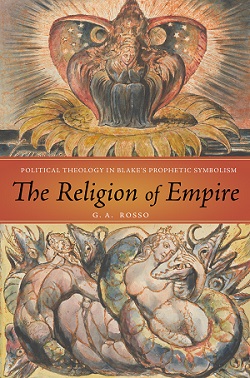The Religion of EmpirePolitical Theology in Blake’s Prophetic SymbolismG. A. RossoLiterature, Religion, and Postsecular Studies |
 November 28, 2016 291 pp. 6x9  $39.95 cloth 978-0-8142-1316-2 Add cloth to shopping cart $29.95 PDF eBook 978-0-8142-7435-4 Add PDF eBook to shopping cart Shopping Cart Instructions Review/Change Shopping Cart & Check-out | |||
|
“The Religion of Empire offers an unparalleled understanding of the complexity of Blake’s epic vision and an unparalleled ability to communicate complex readings and meanings lucidly. I do not believe that there is anyone who understands Blake better.” —Susan Matthews, author of Blake, Sexuality, and Bourgeois Politeness “Rosso’s The Religion of Empire, with its tight entanglements and telling juxtapositions of empire and religion, religion and politics, politics and aesthetics, brings astonishing clarity to poems that have too often seemed an interpretive quagmire. Rosso is agile of mind and audacious in enquiry, attentive to detail, adroit in judgment, and able in controversy. Brilliance and erudition rule each page and together inform every interpretation.” —Joseph Wittreich, CUNY Graduate Center The Religion of Empire: Political Theology in Blake’s Prophetic Symbolism is the first full-length study devoted to interpreting Blake’s three long poems, showing the ways in which the Bible, myth, and politics merge in his prophetic symbolism. In this book, G. A. Rosso examines the themes of empire and religion through the lens of one of Blake’s most distinctive and puzzling images, Rahab, a figure that anchors an account of the development of Blake’s political theology in the latter half of his career. Through the Rahab figure, Rosso argues, Blake interweaves the histories of religion and empire in a wide-ranging attack on the conceptual bases of British globalism in the long eighteenth century. This approach reveals the vast potential that the question of religion offers to a reconsideration of Blake’s attitude to empire. The Religion of Empire also reevaluates Blake’s relationship with Milton, whose influence Blake both affirms and contests in a unique appropriation of Milton’s prophetic legacy. In this context, Rosso challenges recent views of Blake as complicit with the nationalism and sexism of his time, expanding the religion-empire nexus to include Blake’s esoteric understanding of gender. Foregrounding the role of female characters in the longer prophecies, Rosso discloses the variegated and progressive nature of Blake’s apocalyptic humanism. G. A. Rosso is Professor of English at Southern Connecticut State University. | ||||

